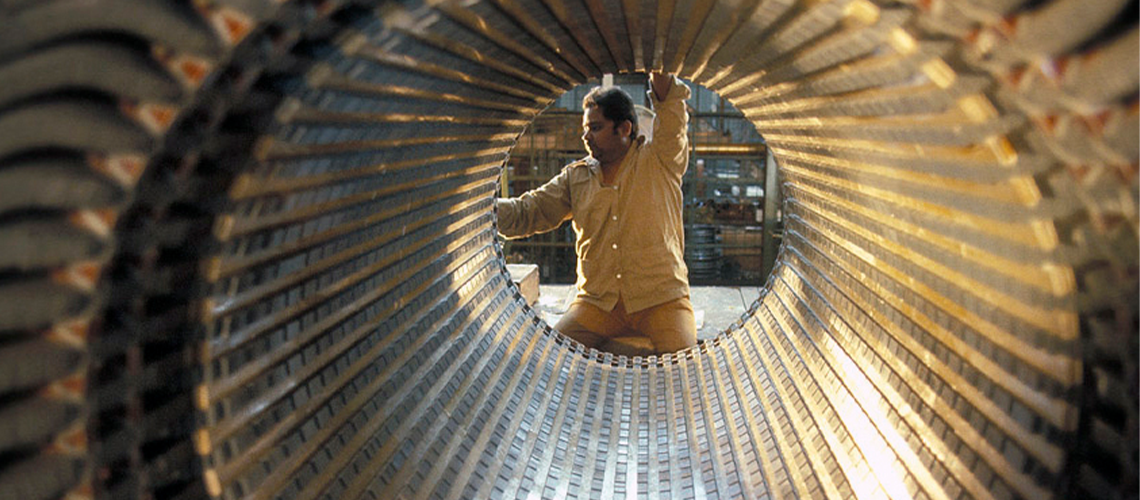 Worker in factory. India. Photo: Ray Witlin / World Bank
Worker in factory. India. Photo: Ray Witlin / World Bank
Infrastructure projects with large contracts dominate the World Bank's portfolio in India. Many of these contracts face problems such as delays and cost overrun due to a variety of reasons, including financial stress in contracting and banking industries.
The economic slowdown triggered by COVID-19 poses difficulties for everyone, including employers, resulting in the delay of payment to contractors further complicating often complex large-scale legal contracts. Many contracts for services are declared “essential” in nature by the government, but the contractor is unable to deliver due to COVID-19-related restrictions. Contractors, as a result, request time extensions or idle charges where applicable.
Sourcing raw material has also become a difficult process because of delays, which may result in further claims. On one hand, the government must deal with keeping the engine running on the various infrastructure projects. On the other hand, there is a concern and obligation to ensure the welfare and safety of the labor force.
The World Bank has tried to mitigate these issues in standard contracts through force majeure, a common clause in contracts that frees both parties from liability or obligation due to an unforeseeable circumstance that prevent someone from fulfilling a contract and other such legal clauses. The application of these provisions at such a large scale, however, is unprecedented in India or any other country. Moreover, there are different interpretations of these clauses by parties to the contract resulting in debates about the "act of God" vs. "act of the government". For example, if COVID-19 is an act of God (where force majeure clause protects both the parties), should subsequent lockdown be also considered an act of God? Or should it be weighed as an act of government (covered in the change of law clause) and, thus, entitle the contractor to claim compensation?
Despite uncertainties created by COVID-19, what is clear is that these large-scale contracts need to be completed in order to achieve project development objectives in a timely and reasonably cost-efficient manner. Thus, the World Bank has been taking an active interest in resolving the issues through measures such as building the capacity of contracting parties , promoting contractual mechanisms such as dispute resolution boards, and ensuring a fair distribution of risks between the parties through standard procurement documents (SPDs).
Recent capacity building efforts included virtual workshops (for example, a workshop on contract management during emergencies was organized in May 2020, which was attended by about 350 officials from government agencies). Renowned experts and experienced Bank staff are faculty members for such workshops and the purpose of workshop is to address the doubts of the implementing agencies about contract terms and conditions. Apart from workshops, the Bank has also partnered with reputable institutions to offer online courses (for example, a certificate in contractual dispute resolution which is attended by both employers and contractors), which are ideal for current situation.
Dispute Resolution Boards (DRB) are a standard requirement of Bank-funded contracts and have been proven to be very effective in avoiding the disputes and resolving them quickly as reported in a previous blog. It is encouraging to note that they are now becoming popular in India and some major Employers like Chennai Metro Corporation are now voluntarily using this mechanism in their contracts. DRBs are particularly useful now and help build confidence between both the parties, so that lengthy disputes including arbitration and litigation can be avoided.
One of the contributing factors to disputes, particularly during current uncertainties, is uneven distribution of risks and responsibilities between the employer and contractor. The World Bank has always paid special attention to this and carefully drafts its standard procurement documents (SPDs) in a way where neither party is disadvantaged during the contract implementation phase. Balanced contracts minimize disputes, due to the built-in objectivity that prevents unfairness.
The health and economic costs of the pandemic are enormous. We are working to ensure that contractual disputes that have risen due to disruptions are minimized in the development projects that will eventually resume.


Join the Conversation